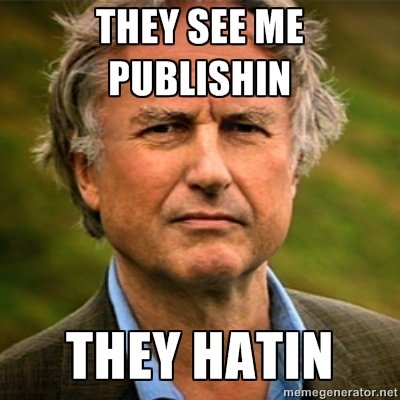Haters gonna hate: Can you be controversial without getting lots of hate?

In the light of some events regarding flag wars triggered by a dissent in opinion between the parts involved (you can read @suesa’s post for an insight into this kind of behavior), I was reminded of an article I wrote a couple years ago, about internet hate and how people react to online criticism. I thought some parts of it could be relevant for this situation so I revamped it a bit in order to discuss some highly relevant points for us as content creators and commenters in Steemit.

“I have a mantra: If you say things of consequence, there may be consequences. But the alternative is to be inconsequential,” the Op-Ed Project’s founder and CEO Katie Orenstein has said.
“My point is not that we should speak up at any cost, but rather that we can’t allow fear of negative feedback to determine what kind of voice we have in the world.”
While this statement holds great importance and truth to it, I can’t help but pointing out that a factor that will greatly determine how your statement will be received is how you say it.
It is true that the more visible and outspoken you are, the more likely you will be to encounter people who dislike you or your views. However, people who get large amounts of hatred usually share some basic features: they can be very self-centered, often arrogant and condescending, and very vocal about ideas that could affect (and in many cases, offend) a large group of people. Feeling the need to broadcast absolutely everything that comes to one’s mind as soon as possible, as well as having a tendency to act out of emotion can also become an issue–since it exponentially increases the chances of saying or doing something stupid/offensive/that rubs the wrong way.
On top of that, many of these consistently controversial people are unapologetic, which seems to have become an euphemism for lacking the ability to recognize one’s mistakes and flaws, deciding to cast them instead as a product of other people’s jealousies or insecurities. Some other times, unapologetic seems to be used for passing rude behavior as just being “very confident and outspoken”, or as a byproduct of a personal quirk.
Take for example, Carl Sagan and Richard Dawkins. While both of them are (were, in the case of Sagan) extremely outspoken, insightful scientists, with views that contradicted the belief systems of many people, one of them receives a lot more hatred than the other–and in case you are not familiar with them, I’ll tell you: it’s Dawkins.

Why is that? It all stems from the way they have behaved and expressed their ideas: while Sagan was firm and presented strong criticisms of highly controversial subjects like religion, pseudoscientific beliefs and politics, he always did it in a respectful way, devoid of visceral emotion and based on facts, evidence and sound arguments, rather than ad hominis attacks or mere denial or imposition of his views. When you read his books, you get the feeling that he is trying to cast light on some issue, rather than just mocking it and those who believe in it.
In contrast, Dawkins has no qualms on implying some people are just stupid, often infusing his discourse with arrogance and having condescending attitudes towards those who don’t share his beliefs or knowledge. That’s where all the difference lies.

We can learn from such observations and apply it to our personal experience. Here are some of the lessons that I have learned for effective communication (especially when dealing with controversial ideas):
Put your ego aside.
Before committing to sending your daring input into the cyber-world, ask yourself: Why are you doing this?
- Do you genuinely want to explain or clarify something?
- Do you think that you have something important to say, or an idea that needs to be shared even though it might unpopular or controversial?
- … Or do you just want to give yourself a quick ego booster by projecting yourself on a higher position while putting others down?
Be honest with yourself. In case you determine that your intentions are not primarily driven by the latter option, you might proceed to the next point.
Don’t condemn, explain.
Being preachy is probably the least effective way to convince people about something. It seems like a no brainer, but many people rush into a heated argument with such haste that they overlook the fact that calling people stupid beforehand because they don’t agree with their views will not make them very receptive to what they have to say.
I find that the best course of action is just expressing your idea in a clear and neutral way, as if you were explaining it to someone who have never heard of it before. If you get questioned, listen to what they have to say, address their concerns and calmly explain why you think differently. You will accomplish a lot more by walking them through the reasoning that made you arrive to your conclusions than by creating division before the dialogue even starts. You might also learn something from them as well!
Be aware of the fact that some people will disagree with you.
I have witnessed how sometimes people express some blunt or controversial opinion, and then get annoyed if they get responses that don’t align with their point of view. What’s the sense in that?
As nice as it feels to get some external validation on one’s views, if I wanted to get only unconditional approval no matter what I say I will just buy one of these:

It sometimes happens that some commenters antagonize you just for the sake of it, or just write nonsense without any base or backup for it. However, when they provide well-structured and thoughtful criticism, it might help you grow. Getting your views challenged is a good exercise on thinking because it can point out some holes in your reasoning or perhaps bring to light different aspects that you had not taken into account before.
Don’t take things personally!
There is no need to feel like you are being personally attacked if someone doesn’t agree with what you stated. This is especially true when it comes to internet forums, blogs and social media, where the interaction one has with other users is mostly limited to whatever they choose to write on a given situation.
Most of the times–unless they are clearly trolling by trying to elicit an emotional reaction out of you– they are engaging with the opinion as presented by you, but not necessarily with you as a person (I might write more about this in a future post). Therefore, acting accordingly by not attaching too much emotion to one’s ideas is more likely to result in a fruitful discussion than acting all hurt and defensive from the get go.

Let's make an effort to keep Steemit as a censor-free platform, while having a space for respectful, productive and reasonable discussion.
Great article, I'd like to point you to this great little video as well about convincing people, it feels like an obvious extension to your post:
This is great. I have been giving a lot of thought to the issue of how to convince people (or at least make them more open to listen) and this delivers some good starting points.
Thank you for bringing this up!, @kate-m!
No worries - if you make some amazing break throughs be sure to share them! :)
Thank you!
This had to be said!
Thanks, @reggaemuffin!
From what I have seen, Steemit has actually quite a low incidence of trolling and flagging wars compared to other platforms, therefore it is very important to keep it that way (or ideally, make it even better).
We all can learn from these incidents and be more mindful of our actions, I know there are always a few irredeemable cases, but most of us are willing to build a great community with true freedom. Cheers!
Financial incentive promotes good behavior, for the most part :)
Did this incident start in chats? I've seen several posts on topics like this in just this one week. It's not happening to people who don't go in chats from what I can tell.
@fitinfun, I don't know how it all started, only the consequences of it which were quite devastating and upsetting. However, this is not something that has happened only recently, unfortunately there have been already a few instances of people getting downvoted into oblivion by someone with lots of steem power because of an argument or dissent in opinion.
Still, while the worst outcome happens when whales engage in this kind of behavior, I have also witnessed minnows downvoting and flagging comments that questioned their opinions (without said comments being offensive, spam or trolling), so I think we should become more conscious about the way we engage in discussion and how we can improve the experience for everyone involved.
We seem to be in different stemit worlds - what topic(s) are you talking about when this happens and how does it happen without you knowing how it starts?
I've read of a crazy downvoter once in the past - I read at the time that if you get your info to the whales they will come over top and down-vote the offender if you can show what happens.
Also - in chat you can actually block someone, I think. Maybe doing that instead of engaging over there might stop the person from hitting you on steemit where it matters the most.
What I am referring to is Steemians (usually people with lots of Steem Power) that use their flagging ability to censor users and posts with opinions or information they don't like (instead of using it as intended: to report spam, plagiarism, hate speech, etc.)
Like I said before, I don't know details about how this last incident (the one that triggered the most recent posts on this behavior) originally started, all I know is that in the end one well-established user (sadly, one of the people who actually produces original, well-researched quality content) got not only their pending rewards but also their reputation wiped out down to zero by a whale who antagonized with the contents they were posting.
That would imply for the rescuer whale to directly pick up a flag war with another whale, which doesn't sound like something many would be willing to do.
Even if they do, the problem is that some people are very persistent. In this case, even though the affected person had a whale on their side helping restore the lost reputation score (if not the rewards), the crazy downvoter kept coming back every day using their full power to downvote everything back to zero. So in the end it just becomes a war of attrition. And that's having a whale on your side! Imagine the situation with most minnows who don't have "powerful friends".
I don't see how blocking someone on chat would help to prevent their enforced censorship on Steemit, since they would still have full access to your content and are free to flag whatever they please.
What general topic are they censoring? I know some of the alt-health stuff or conspiracy issues can get people upset. Is the bad guy checking the tag and going after all steemers on the topic, or just after one person with a vendetta?
I saw a comment (long ago) that mentioned the idea of taking these type of bullying issues to the whales no matter who you are or who you know. I'm not knowedgable on the various whales, but maybe jerrybanfield would be one to take this problem to. He's pretty helpful to little guys.
Thanks for the post! No time to hate, is my motto!
@sandzey, indeed, that time could be spent on more productive (or enjoyable) endeavors.
No matter how non controversial you are, you will still get a lot of hate from people who are crooks. Fortunately, they are the minority.
Maybe they dislike you for being non-controversial! ;-)
Spread the love my friend, nicely written! Don't hate!
Thank you, @kylaki!
Thanks @irime , Iuplvoted this post and was excited to see for the first time my two cents worth counted!
Hehe, thanks a lot! ;-)
In regards to Dawking i am pretty sure ( dont quote on this ) im pretty sure the word he used was sick, as in victims of a virus, but then again while i agree that he is somewhat aggravating when he addresses religious people he is totally free to be so, he is answered in kind most of the time, I would also mention the late Hitchens as a prime example of this topic, but man, how i loved that man, his eloquence was awe inspiring.
Well done and well said I just want to be here as family I love being here and thank you for you all guys for this huge awesome fruitful informative post cheersss @irime I up voted this for you and all love and blessing to all
True!!!
Nearly the Same subject i have on German here. Great article and thanks for sharing with us